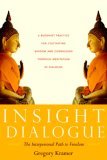pp.56-59
The desire for pleasure has as its handmaiden the fear of pain, the hunger for being seen is shadowed by the fear of invisibility, and the hunger for escape brings with it the fear of engagement and intimacy. At the root of all these fears is a terror of emptiness, the concern that this self - personal or social - will die in a cold nothingness. This terror is usuaslly kept beneath the surface of consciousness, recognized only by its surface manifestations: an avoidance of being alone, the fear of being criticized,a pulling back from close relationships.
GK p.57
Do you find yourself avoiding being alone? Fearing criticism? Pulling back from close relationships?
Can you recognize one of these as a personal pattern? Can you choose which hunger is predominant in your experience and investigate it more closely?
This segment of the text will support such an investigation as it addresses the fading of each of the three hungers in turn.
GK p. 57 continued
...the hunger and the fear are two facets of the same thing...when the meditative mind sees the root fear and meets it with acceptance, [the fear] begins to diminish - and all the hungers dissolve with it. With such fading, relationships cease to be powered by longing and desperation.
Wednesday, October 22, 2008
Tuesday, October 7, 2008
Cessation
Wbat is the noble truth of the cessation of suffering?
Cessation refers to the lessening of toxic qualities in our lives: specifically lessening of the hungers for pleasure, being, and nonbeing and diminishment of the unwholesome roots of greed, hatred, and delusion nurtured by the hungers. Ignorance about the nature of identification and impermanence also diminishes in this cessation. As these intoxicants fade, the quality of life improves. Part of the path of their fading involves the cultivation of certain qualities, such as clear awareness, compassion, wise attention, and insight. But fundamentally, the focus is on the fading. What remains is ease, goodness, wisdom, and joy.
The happiness born of peace, when the hungers subside like the last receding wave on a glassy summer sea, is exquisite and stable.
GK, pp.55-56
Cessation refers to the lessening of toxic qualities in our lives: specifically lessening of the hungers for pleasure, being, and nonbeing and diminishment of the unwholesome roots of greed, hatred, and delusion nurtured by the hungers. Ignorance about the nature of identification and impermanence also diminishes in this cessation. As these intoxicants fade, the quality of life improves. Part of the path of their fading involves the cultivation of certain qualities, such as clear awareness, compassion, wise attention, and insight. But fundamentally, the focus is on the fading. What remains is ease, goodness, wisdom, and joy.
The happiness born of peace, when the hungers subside like the last receding wave on a glassy summer sea, is exquisite and stable.
GK, pp.55-56
Labels:
third noble truth
Sunday, October 5, 2008
The End of Suffering
Gradual Cessation pp 54-56
What would it be like to live with less hunger? What would it be like to see the world, to meet other people, free from the anthill obsessions that occupy our thoughts and congest our emotions? It may be simpler than it first appears. We do not have to try to be happy, cultivate compassion, embrace some religions concept, or withdraw from other people. We can speak simply of the ease at the storm's end.
GK p. 54
What would it be like to live with less hunger? What would it be like to see the world, to meet other people, free from the anthill obsessions that occupy our thoughts and congest our emotions? It may be simpler than it first appears. We do not have to try to be happy, cultivate compassion, embrace some religions concept, or withdraw from other people. We can speak simply of the ease at the storm's end.
GK p. 54
Labels:
third noble truth
Subscribe to:
Comments (Atom)



